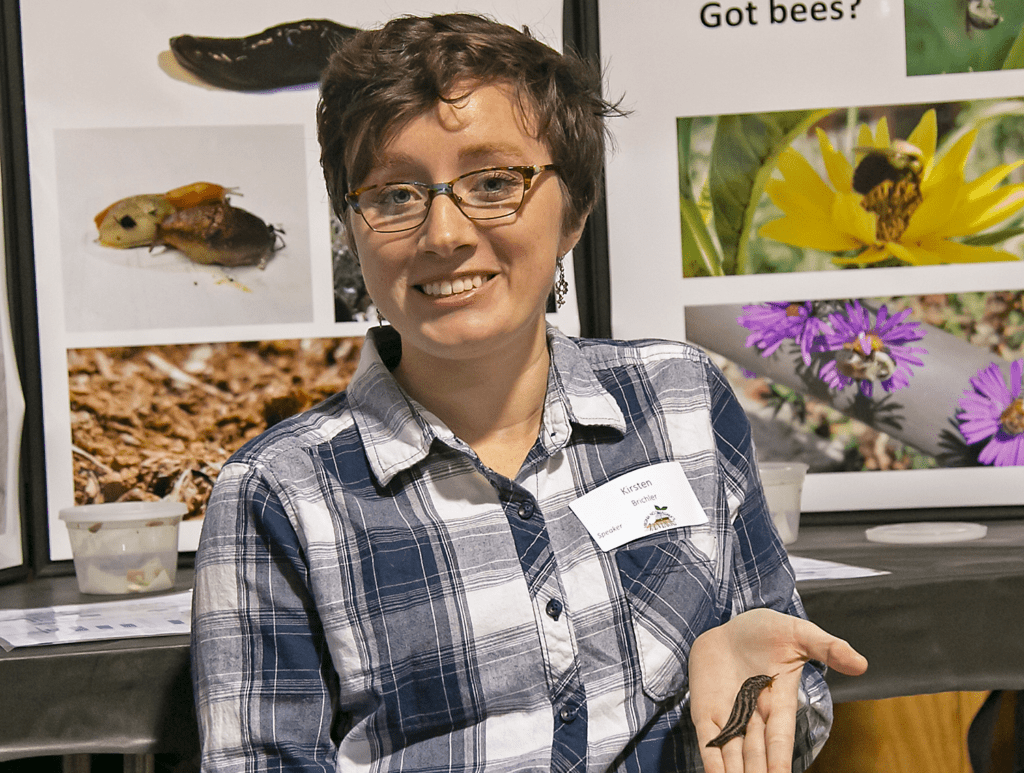Mar 18, 2019Entomology student seeks slug management strategies
One year into a long-term research project, Kirsten Brichler thinks she might be moving toward a familiar conclusion.
“I need more data,” Brichler said, “but what I found last year seems to back up what farmers have probably been hearing for the last several years – broadcast, pre-planting insecticides not only don’t inhibit slug populations, they actually encourage their growth.”
Agricultural entomologist Brichler, an Indiana native who is seeking a master’s degree at Virginia Tech, gave a “sneak peek” progress report on her project in February to attendees at the Virginia No-Till Alliance Conference at the Rockingham County Fairgrounds, an event presented in partnership with the United States Department of Agriculture’s Natural Resources Conservation Service and Virginia Cooperative Extension.
Shenandoah County Extension agent Bobby Clark was one of the prime movers in getting the project underway. He collaborated with the Natural Resources Conservation Service to get funding through a Conservation Innovation Grant and wanted it staged in the area he has served since 1996.
“I don’t have hard numbers,” said Clark. “But my experience tells me we have a larger issue with slugs in the northern valley than almost anywhere else in Virginia. While slug damage might not be the number one problem for all my local farmers, I think it is the number one thing keeping most of them from switching to no-till.”
Last year, Brichler tracked slug numbers on 19 farms, most of them in Shenandoah County. This spring and summer, she will return to the same region for more research.
Her ultimate goal is to measure the impact of different crop management strategies on both slugs and three primary slug predators: harvestmen (also called “Daddy Longlegs”), ground beetles, and wolf spiders.
“The biggest issue with the pre-plant broadcast applied insecticides may be their negative impact on harvestmen and ground beetles,” she said. “When the predators are killed off, slugs tend to thrive. Wolf spiders seemed unaffected by crop management methods but use of the insecticides had a big impact on the other two.”
Cover cropping combined with vertical tilling or no-till appear to provide the best environment for slug predators.
“Bobby Clark has been promoting this idea for several years,” Brichler said. “I’d say about half the growers applied the broadcast insecticide in the fields we monitored last summer. They do it to control cutworms, but we have other suggestions in that area that don’t make life easier for slugs.”
Brichler also debunked the popular idea that traps filled with beer can be effective in slug control. She presented a video at the Virginia No-Till Alliance Conference that showed slugs entering a beer trap, drinking their fill, and then leaving the scene.
“We know that slugs love beer,” she said. “But the time-lapse video shows they don’t stick around to be trapped. All a beer trap does is give them a free drink.”
Whatever the study’s ultimate conclusions, Clark said his corn and soybean farmers will be happy to have actual data in their hands before they make decisions on crop management.
“As of now, I’d encourage farmers to look at our early data on broadcast pre-plant insecticides and to note that we already have the slug predators in place in our fields and don’t need to bring them in from somewhere else,” he said. “We just need strategies to boost their numbers.”
Clark said he appreciated the continuing support of the Natural Resources Conservation Service as well as Sally Taylor, an assistant professor of entomology at Virginia Tech, who wrote the successful application for Brichler’s grant.
Between 2010 and 2018, the Virginia Natural Resources Conservation Service invested $2.3 million in 38 Conservation Innovation Grant projects designed to stimulate adoption of innovative conservation approaches and technologies, including pilots and field demonstrations.
“NRCS has been with me since our first small project on slugs seven years ago,” Clark said. “We could very well come out of this in another two or three years with very specific recommendations on tilling, cover crops, and crop rotations that could be a big help to growers here and everywhere in Virginia. This is important work, and Kirsten’s off to a great start.”
– Zeke Barlow , Virginia Tech University

















